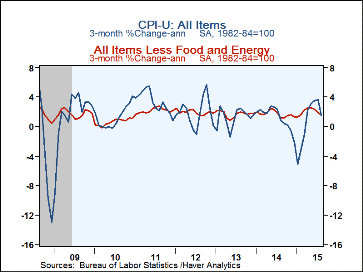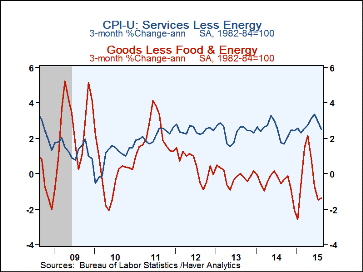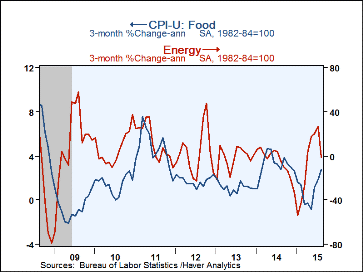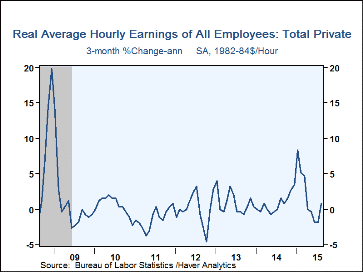 Global| Sep 16 2015
Global| Sep 16 2015U.S. CPI Decline Reflects Lower Energy Costs; Core Prices Rise Minimally
by:Tom Moeller
|in:Economy in Brief
Summary
The Consumer Price Index eased 0.1% during August (+0.2% y/y) and reversed the prior month's increase. It was the first shortfall since a 0.7% decline in January. Prices excluding food & energy notched 0.1% higher (1.8% y/y) for a [...]
The Consumer Price Index eased 0.1% during August (+0.2% y/y) and reversed the prior month's increase. It was the first shortfall since a 0.7% decline in January. Prices excluding food & energy notched 0.1% higher (1.8% y/y) for a second month. No change in the total and a 0.2% rise in core prices were expected in the Action Economics Forecast Survey.
A 2.0% fall (-15.0% y/y) in energy prices was the first decline since April. The easing was paced by an 8.1% drop (NSA) in fuel oil prices which are down more than one-third y/y. Gasoline prices followed with a 4.1% drop (-23.3% y/y) following three months of increase. Natural gas prices countered these declines with a 1.2% gain (-11.5% y/y) which reversed the prior month's decline. Electricity costs moved 0.3% higher (-0.6% y/y).
Food prices rose 0.2% (1.5% y/y) for a second straight month. Egg prices jumped 7.7% (35.3% y/y) while fruit & vegetable prices gained 1.5% (0.1% y/y). Seafood prices firmed 1.3% (-1.5% y/y) but meat prices declined 0.4% (0.3% y/y). Cereal & bakery product prices eased 0.1% (+1.1% y/y).
Goods prices other than food & energy slipped 0.1% (-0.5% y/y) for the fourth straight month. Prices have fallen a 0.1% rate so far this year after last year's 0.3% decline. Household furnishings & supplies prices declined 0.4% (-1.4% y/y), the fourth consecutive monthly shortfall while appliance prices eased 0.2% (-3.5% y/y). Recreational product prices continued lower by 0.4% (-2.6% y/y) and new vehicle prices eased minimally (+0.6% y/y). To the upside, apparel prices gained 0.3% (-0.9% y/y) for a second straight month as medical care goods prices rose 0.3% (3.4% y/y) as well. Educational book & supply prices improved 0.2% (4.7% y/y).
Services prices less energy ticked 0.1% higher (2.6% y/y), the weakest performance in six months. Shelter prices led the latest gain with a 0.2% rise (3.1% y/y). The cost of lodging away from home eased 0.6% (+1.7% y/y) but primary residence rents improved 0.3% (3.6% y/y). Owners' equivalent rent of primary residence gained 0.2% (3.0% y/y). Recreation services prices eased slightly (+2.5% y/y) and medical care services costs also slipped a bit (+2.2% y/y). The cost of using public transportation declined 1.7% (-2.9% y/y). Tuition & other school fees costs eased slightly as well (+3.5% y/y), the first decline since July of last year.
Minimal inflation readings left real average hourly earnings growing 0.5% (2.0% y/y), the largest monthly rise since January.
The consumer price data is available in Haver's USECON database while detailed figures can be found in CPIDATA. The expectations figure is from Action Economics and is found in the AS1REPNA database.
| Consumer Price Index, All Urban Consumers (%) | Aug | Jul | Jun | Aug Y/Y | 2014 | 2013 | 2012 |
|---|---|---|---|---|---|---|---|
| Total | -0.1 | 0.1 | 0.3 | 0.2 | 1.6 | 1.5 | 2.1 |
| Total less Food & Energy | 0.1 | 0.1 | 0.2 | 1.8 | 1.7 | 1.8 | 2.1 |
| Goods less Food & Energy | -0.1 | -0.1 | -0.1 | -0.5 | -0.3 | -0.0 | 1.3 |
| Services less Energy | 0.1 | 0.2 | 0.3 | 2.6 | 2.5 | 2.4 | 2.4 |
| Food | 0.2 | 0.2 | 0.3 | 1.6 | 2.4 | 1.4 | 2.6 |
| Energy | -2.0 | 0.1 | 1.7 | -15.0 | -0.3 | -0.7 | 0.9 |
Tom Moeller
AuthorMore in Author Profile »Prior to joining Haver Analytics in 2000, Mr. Moeller worked as the Economist at Chancellor Capital Management from 1985 to 1999. There, he developed comprehensive economic forecasts and interpreted economic data for equity and fixed income portfolio managers. Also at Chancellor, Mr. Moeller worked as an equity analyst and was responsible for researching and rating companies in the economically sensitive automobile and housing industries for investment in Chancellor’s equity portfolio. Prior to joining Chancellor, Mr. Moeller was an Economist at Citibank from 1979 to 1984. He also analyzed pricing behavior in the metals industry for the Council on Wage and Price Stability in Washington, D.C. In 1999, Mr. Moeller received the award for most accurate forecast from the Forecasters' Club of New York. From 1990 to 1992 he was President of the New York Association for Business Economists. Mr. Moeller earned an M.B.A. in Finance from Fordham University, where he graduated in 1987. He holds a Bachelor of Arts in Economics from George Washington University.










